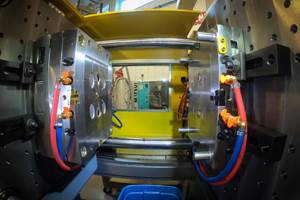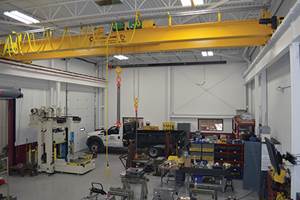Service With a Smile
Suppliers are thinking of innovative ways to expand customer service programs - offering total support for a machine tool's lifespan.
By Sherry L. Baranek Late last year, moldmaker Stu Mauthe of Wawona Tool (Hustisford, WI) watched his lifelong dream of owning a tool shop go up in smoke when his vertical machining center got "repossessed." The owner of a 1,200-square-foot, one-man shop for five years, Mauthe scraped by with little salary for himself while he pursued his passion. He was doing "very well for himself" when he purchased an $86,000 vertical machining center, but it all went downhill from there.
According to Mauthe, he purchased a lemon, plain and simple. "I went through three spindles in 850 hours," he states. "Every time I contacted the supplier to 'fix' the machine, it was too late. At one point I didn't hear from them for four months after numerous letters and faxes. I feel that the failure of this machine to perform to promised standards is totally responsible for the downfall of my business."
While Mauthe's situation seems to be the exception rather than the rule, there are ways to avoid such a nightmare. Mauthe admits to not fully comprehending the fine print of the terms of the sale, and due to pending litigation, is unable to comment further on the matter. Suffice it to say there was definitely a breakdown in communications between moldmaker, supplier and equipment manufacturer.
This year, increasing competition among suppliers has resulted in a trend toward total customer support. A number of bells and whistles have been added to current customer programs to ensure total coverage for the entire life of the machine - everything from preventive maintenance and online support to technical centers in convenient locations.
Vince Lomax, vice president of Tech Mold, Inc. (Tempe, AZ) - a plastic injection mold builder - is generally satisfied with the level of customer service that his company receives. "Right now, we are all facing a very competitive environment, and our customers are asking us to give input as to what we can do to become more competitive," he states. "So, we are doing the same with our suppliers. The suppliers that we are most pleased with are the ones that give us outstanding service without compromising and are sensitive to our customers' needs by offering us some innovative ways to help reduce our costs. In some cases it's a win-win situation - not only reducing our cost but also theirs.
"This is something new in our industry. we've never faced this before," Lomax continues. "The suppliers that we share this concept with are receptive to it - they ask us what they can do to work together to help all of us reduce costs. It's a collaborative effort by both parties to help reduce costs."
Lomax stresses the need for after-sale support in the highly technical world of moldmaking. "We expect a high level of technical support in order to implement all of the new technology out there and that the support be available in a timely manner," he explains. "Suppliers we hold in the highest esteem are extremely customer sensitive - as we are. We also have a high degree of respect for the suppliers that anticipate our needs. They develop new components or sub-assemblies. One good example is the hot manifold manufacturers. Today we can buy a complete bolt- on manifold. This was unheard of years ago - having the ability to purchase finished components that are ready for assembly or in some cases may require modification help the moldmaker to be more efficient and efficiency translates into reduced cost. These kinds of service providers are the ones who will be successful and that everyone will enjoy doing business with."
Victor Williams, manufacturing systems specialist for Bryan, OH-based Ingersoll-Rand Co.'s machining production facility, agrees. "If someone treats me right I am going to come back to them," Williams states. "I think some of these suppliers sense this. Since things have gotten fairly competitive, I've found that prices are not fixed now - everything is negotiable."
Williams adds that it's important that it be known that you are not just in business for today, but also into the future. "If someone wants to continue to be my supplier, he needs to pretty much satisfy my immediate needs, otherwise I'm going to move on," he emphasizes. "I find myself talking to my suppliers often about what other people offer so they don't become complacent."
Showing Support
Obviously all equipment suppliers have some sort of customer service program in place to address the aforementioned needs, but the question is how complete is that service? Manufacturers have recently come up with some novel ways to service the customer - keeping them satisfied and coming back for more.
In an attempt to provide its customers with access to the latest in moldmaking technology, application consultation and training resources, Mason, OH-based Makino - an EDM and CNC milling machine manufacturer - recently opened seven technical centers strategically located throughout the United States that operate in partnership with its distributors.
According to Rhonda Raque, die/mold manager, customer support at Makino, applications and service engineers are present in each tech center to lend its customers support. "It all comes down to education and application of that information," she comments. "Post-sales support offers our customers a competitive advantage and it's the most important aspect of the tech centers' existence. Our applications engineers can familiarize themselves with each moldmaker's needs and can continue to offer assistance to improve their utilization of the technology and the machinery."
Raque also points out that potential customers can come to the centers before they make their purchasing decisions to learn more about the technology and become informed buyers. Some customers bring an actual cavity or core that they have been running to learn how Makino might approach it. "We will go through, look at their programming, make any improvements to the toolpath that we deem necessary, then run it on our machine to show them the benefit of our equipment," Raque says.
Makino works with the tech center personnel and with its customers on a one-on-one basis and conducts at least 20 different seminars throughout the year. According to Jason Habib, RAM EDM applications engineer, "Everyone knows everyone in this trade and you can't afford to make people unhappy. Keeping your name out there is absolutely vital for what we do here."
Agie, Ltd. (Davidson, NC) - another EDM equipment manufacturer - has found success bringing the customer support right to its customers' front doors. President Gabriele Carinci explains that the impetus for deploying service vans was to facilitate on-site service of the company's EDM systems throughout the United States and Canada. Each van contains tools, materials for test cuts, electronic test equipment, reference materials and everyday wear parts such as belts and rollers. The traveling engineers are equipped to perform emergency repairs, new EDM system setup, general service and warranty work or required periodic inspections.
"We want to make it easier for our customers to do business with us and we want to shorten the timeframe to complete whatever service they require," Carinci notes. "By also offering preventive maintenance programs, we're helping customers maximize the uptime of their machine tools. All customers are under stress to get their jobs done 'just in time.' The objective is to minimize downtime. Productivity, productivity, productivity - those are the three most important criteria for success!"
Over at Cincinnati Machine (Cincinnati, OH) - a machining equipment manufacturer - customers don't even have to leave their machines when they require customer service. The company's Cincinnati Plus program offers customers the ability to link directly to technical support specialists interactively, using only a standard phone line. With Interactive Techsupport - another Cincinnati Plus service - Cincinnati Machine support technicians and application engineers can connect with a customer's CNC machine and transfer video, voice and data bi-directionally.
"Once connected, the machine's CNC screens are displayed on our PC and we can now remotely manipulate the screens to help diagnose the problem. At the same time we can see and hear what the customer's machine is doing," program manager Greg Stewart explains. "Then if we need to go and service the machine, we are better prepared, and it won't take as long to solve the problem. We also can look at the customer's part programs and offset setups, as well as download software upgrades to the machine if necessary." He adds that the program educates the customers' maintenance personnel and machine operators.
Focus on the Future
Given the variety of methods that suppliers are employing to service, support and satisfy their customers, things can only get better. Look for the Internet to play an even bigger role in enhancing customer support - including live Internet demos, Internet based training, remote diagnostic monitoring, automatic service notification, automatic service dispatching and more at-the-machine training. Engineers will continue to receive higher levels of training so they can troubleshoot more quickly and decide if a problem is machine tool or applications related. Agie's Carinci sums it up nicely: "Either make your customers happy or you are out of business!"
Thomas Botelho, Makino's customer support team leader, adds, "We have a saying here. The first machine is sold by the sales team and the second machine is sold by customer service/support."
Related Content
Predictive Manufacturing Moves Mold Builder into Advanced Medical Component Manufacturing
From a hot rod hobby, medical molds and shop performance to technology extremes, key relationships and a growth strategy, it’s obvious details matter at Eden Tool.
Read MoreThe Role of Social Media in Manufacturing
Charles Daniels CFO of Wepco Plastics shares insights on the role of social media in manufacturing, how to improve the “business” side of a small mold shop and continually developing culture.
Read MoreThe Trifecta of Competitive Toolmaking
Process, technology and people form the foundations of the business philosophy in place at Eifel Mold & Engineering.
Read MoreHow to Improve Your Current Efficiency Rate
An alternative approach to taking on more EDM-intensive work when technology and personnel investment is not an option.
Read MoreRead Next
Are You a Moldmaker Considering 3D Printing? Consider the 3D Printing Workshop at NPE2024
Presentations will cover 3D printing for mold tooling, material innovation, product development, bridge production and full-scale, high-volume additive manufacturing.
Read MoreReasons to Use Fiber Lasers for Mold Cleaning
Fiber lasers offer a simplicity, speed, control and portability, minimizing mold cleaning risks.
Read More.jpg;maxWidth=970;quality=90)











.jpg;maxWidth=300;quality=90)







